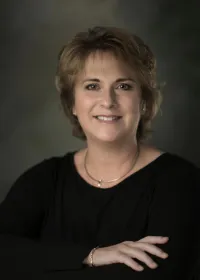
meet Leslie Ferris Yerger

In November 2017, I received a devastating diagnosis—Stage IV breast cancer—despite having just received an “all clear” from both a mammogram and an ultrasound. The cancer had been lurking in my dense breast tissue for over a decade, undetected by standard screening methods, until a routine bone density scan revealed that it had already metastasized to my bones. This experience exposed the significant shortcomings in our current breast cancer screening standards, and it has driven me to become a fierce advocate for women’s health.
As a TEDx speaker, author of Probably Benign, and a women’s advocate with a laser-focused mission, I am committed to ensuring that no woman faces the same fate I did. That's why I founded the nonprofit My Density Matters. Through this organization, I’m determined to empower women to discover their breast density, explore their screening options, and advocate for the additional breast cancer screening they need. My goal is simple: I don’t want my story to become your story.
I graduated from Purdue University with degrees in Computer Science and Industrial Management and later earned my MBA from the University of North Carolina at Chapel Hill. I’m a proud mother of three adult children, and I live in Hawthorn Woods, IL, with my husband, John.
At My Density Matters, our vision is a world where breast density no longer hinders the early diagnosis of breast cancer. By empowering women with the knowledge and tools to advocate for their health, we can change the landscape of breast cancer detection and save lives.
As I often say, "My Density Matters empowers women to find out their breast density, learn their additional screening options, and take control of their breast cancer screening. We envision a world where breast density no longer hinders the early diagnosis of breast cancer. I don't want my story to become your story."

Why Your Breast Density Matters
Breast density plays a crucial role in the early detection and accurate diagnosis of breast cancer. However, many women are not informed about what breast density is and its impact on their health. A study by Myriad Genetics found that 44% of women lack understanding of breast density, and 63% are unaware of its link to cancer risk.(1)

Dense breast tissue appears white on a mammogram, just like cancer does. This similarity in appearance makes it challenging for radiologists to distinguish between dense tissue and potential tumors. Consequently, the presence of dense breast tissue can significantly hinder the ability to detect cancer early on. This combination of factors creates an ideal scenario for cancer to go unnoticed, potentially allowing it to develop and spread without early intervention.

Dense breast tissue appears white on a mammogram, just like cancer does. This similarity in appearance makes it challenging for radiologists to distinguish between dense tissue and potential tumors. Consequently, the presence of dense breast tissue can significantly hinder the ability to detect cancer early on. This combination of factors creates an ideal scenario for cancer to go unnoticed, potentially allowing it to develop and spread without early intervention.

How Do You Know If You Have Dense Breasts?
A physical exam alone cannot identify dense breast tissue. Instead, a radiologist assesses your breast density through a mammogram. The most common method for determining your breast density is by reviewing your mammogram report. To learn more about breast density and its implications, please visit our website at My Density Matters or text “Check Your Chart" to 211-411 for additional information.
Unlocking Empowerment: An Action Plan for Your Breast Health Take our Breast Cancer Screening Guide
As we head toward October (Breast Cancer Action Month), it is the perfect time to embrace a proactive approach to your health and well-being. Whether you are 25 or 65, there is a crucial aspect of health that often goes unnoticed—your breast cancer risk, including your breast density. At My Density Matters, we believe in empowering women to take control of their breast health, and we've crafted a simple guide that can make a significant difference in your life.
Understanding your Risk: Knowledge is Power
Breast density is a key risk factor for breast cancer risk. Breast density can influence your breast cancer risk in two ways: dense breast tissue increases the risk of breast cancer and can mask the development of cancer on a mammogram. Consequently, breast density can impact the early detection of breast cancer.
The American College of Radiology (ACR) provides guidelines that can help women in making informed decisions about their breast health - now including women as young as 25 years old. Our guide, tailored to align with these recommendations, is designed to be user-friendly and time-efficient.
Understand what it means for YOU: Personalized Screening Plans
At My Density Matters, we want you to be on top of the recent updates to the ACR recommendations and understand how they apply to you and your breast health plan. Upon completing the guide, you will receive a screening plan. Our screening guide takes your answers to each question and matches your answers to the ACR recommendations. Your screening plan reflects how you align with the ACR recommendations.
The Quick and Easy Guide
Taking just a few minutes of your time, our guide walks you through the essential pathways to understand your breast density and other potential risk factors, and provides personalized recommendations. Knowledge is the first step towards empowerment, and this guide arms you with the information you need to make informed choices about your health.
Turning Knowledge into Action
Once armed with the information from our guide, you can take immediate action based on your unique situation. Our guide is a source of information - We want you to bring your screening plan to your physician and discuss your next steps. Whether it is scheduling more frequent screenings, exploring additional imaging options, completing a risk assessment, or seeking advice from a breast specialist, our guide empowers you to be in control of your well-being.
Make it Your Breast Cancer Action Month (October) Resolution
This fall, make a resolution to prioritize your breast health. Taking a few minutes to follow our guide can set the tone for empowerment and proactive self-care. Your health is an investment, and with our guide, you're equipped to make choices that resonate with your well-being.

Filter by Category
Filter by Date
© 2017-2024 ~ Sharon Ringier Consulting ~ All Rights Reserved.
Website Terms & Conditions | Online Privacy Policy




